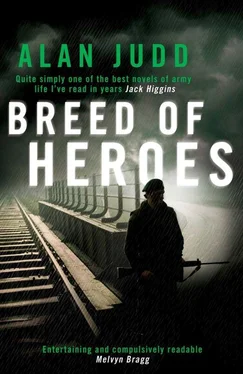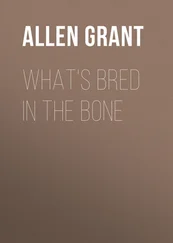Edward, who had been fiddling with a government issue biro, looked up earnestly. ‘Yes, sir. More than once.’
‘Hard targets, gentlemen. I cannot emphasise that enough, though God knows I’ve been saying it since before we arrived. And yet still — still — people — or, rather, officers — walk in pairs beneath street-lamps in terrorist areas and wonder why they get shot. Think yourselves lucky, all of you, even those who weren’t there, because you could well have been. Any questions?’
The CO looked around, his jaw thrust forward as though that was where he wanted to take the questions when they came. But none came, his glance softened, he allowed his lips to relax into a wry little smile and his brown eyes twinkled. ‘Good. Take it you all understand. Now for the good news. Within the last hour a car was stopped at a VCP in the City Centre. Five men in it, three of them armed, and all five live in the new estate. The brigadier wants us to search their houses in conjunction with the RUC, and we are at this very moment waiting for confirmation from Brigade. It’ll stir up trouble, I daresay, but that’s all right with me. Good. Now, three platoons from A and Support companies will RV here in fifteen minutes. Their job is to stand by in case of trouble. Edward, I want your platoons to do the actual search because they know the estate best. I shall lead the attack but I want you on hand to deal with any trouble the way you dealt with that Peace Line business — straight in and no nonsense. Don’t give ’em a chance to get going. Okay?’
‘Right, sir.’ During the next half hour preparations were made and Edward bustled around busily, becoming the more irritable as his grasp of what was going on grew weaker. The CO was also busy being decisive but was obviously in high good humour. At one point he clapped his hand on Chatsworth’s injured shoulder and said, ‘Well done, my boy, well done. You’ve done the battalion a power of good. Keep it up.’
When the three standby platoons arrived there was more noise and confusion in the Factory than ever. The ops room became an extension of battalion headquarters, taking on its atmosphere of tension, panic, fear and frenetic activity. Very soon everyone seemed to have at least three things to do which depended upon their getting hold of someone else who either couldn’t be found or also had three things to do. The CO gave orders in a loud voice and then demanded in an even louder voice to know what had happened about them. Edward flapped and squawked like a worried hen but no one paid him any more than the most formal attention. It was a place that Charles would normally have sought to avoid with all manner of ruses and stratagems, but on this occasion he hung around trying to have a word with Nigel Beale. He and Chatsworth had decided to pass on to Beale, in a suitably disguised form, the information about the boxes in the monastery. In remaining in the ops room at such a time they risked being given unnecessary tasks or being accused of being idle, which amounted to the same thing, but they had decided the matter was of sufficient importance to justify temporary discomfort. Chatsworth was despatched to do a weapon inspection before they had a chance to get to Beale, who was busy with the CO, but Charles persisted and eventually got him alone. He told him that a man had approached them on the street, some time before the shooting, and had told them that there were boxes with weapons in them hidden in a tunnel beneath the monastery. Such incidents were not uncommon: people sometimes approached patrolling soldiers at night and volunteered information of varying importance and reliability. Often they would just say that there was a weapon in number forty-six or that there was going to be trouble on Saturday, but they would never reveal their identities or how they came by the information. Nevertheless, the soldiers who patrolled regularly knew some of them by sight.
Nigel was intensely interested. ‘He told this to you and Chatsworth? How reliable is it?’
‘No idea. Never seen him before.’
‘Sounds very plausible, though. Just the sort of place they would use if they could get access to it. Probably Armalites.’
‘That’s what we thought.’
Beale looked suspicious. ‘What made you think that?’
‘They said on television that Armalites were coming from America.’
Nigel drew closer. ‘Keep this to yourself, Charles. Even if there’s nothing in it we don’t want it getting about. It would be a dangerous rumour to have around. I’ll pass it on to the CO as soon as I can get a word in.’ He made a crabbed little note on his mill-board and nodded conspiratorily to Charles.
The search teams moved out at 2245 hours. The search was to go in at 2300. Charles had with him a corporal and three soldiers, as well as three RUC constables who were to do the actual searching. In charge of the RUC men was a Sergeant Mole, sent from the police station occupied by battalion HQ. He was a portly, silver-haired, easy-going man with a pleasantly soft accent instead of the usual Belfast one. ‘Ever done a search before, sir?’ he asked Charles.
‘No, I haven’t. I shall be looking to you for guidance, Sergeant Mole.’ It had taken Charles some time to get used to the RUC’s strict adherence to military command structures.
Sergeant Mole lit his pipe, his double chin bulging over his green collar. He looked reassuringly avuncular. ‘Nothing to worry about, sir. I’ll do the talking and you send your men clean through the house into every room straightaway in case there’s anyone who wants to try any funny business. Tell them to get everyone in the house down into the front room. Then search the garden and any sheds. When we start to search we’ll take a room each and have one of your men with each of us in case we find any villains hiding in the airing cupboard or in case anyone claims we planted a howitzer in there. Wouldn’t be the first time, I’m afraid.’
They moved in convoy to the estate and then each search party, with its escort, drove quickly to its appointed address. The estate was unlit, as usual, although many of the houses still had their lights on. It was not a cold evening, and groups of people sat drinking on some of the doorsteps. Other groups were gathered on street corners. Derisive shouts followed the convoy as it moved in and there was a desultory banging of dustbins, but the operation was mounted too quickly for the warning to be effective.
The object of Charles’s search was an end-of-terrace house with a rubbish-heap of a garden but no broken windows and a front door that still showed traces of paint. The escort party debussed and crouched by the tatty privet hedges in the street while a couple ran round to the back of the house to cut off any escape through the gardens. Sergeant Mole knocked on the door with Charles beside him and the rest of the party by the side wall out of sight. It was opened by a diminutive, middle-aged woman with grey hair, a bony, wrinkled face and glasses with very thick lenses. ‘Mrs Ray?’ asked Sergeant Mole. She stared at the uniformed men. Her lips moved once as though to speak but she said nothing. ‘We’ve arrested your son Michael and I’m afraid we’re going to have to search your house, Mrs Ray.’ She still said nothing. Sergeant Mole stepped purposefully inside and she moved back hesitantly. ‘I’m sorry, Mrs Ray, but we have to search the house.’ She let go of the door handle and ran into the living room with one hand over her face. Charles stepped inside and beckoned the soldiers to follow. There was an unpleasant, airless smell, and the sounds of a television came from the living room. The corporal and one soldier ran straight upstairs, their boots thumping heavily, and the two other soldiers went quickly through the downstairs rooms. Charles followed Sergeant Mole into the living room. The woman stood by the electric fire, still with one hand over her face, holding a girl of about twelve with the other. A short, fat man with curly dark hair and wearing braces turned down the sound on the television. ‘Sorry to have to do this, Mr Ray,’ said Sergeant Mole, ‘but your son was found driving a car in which there were arms and wanted men. Could you tell me which is his room?’
Читать дальше












